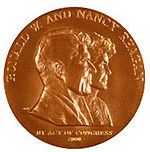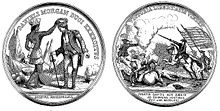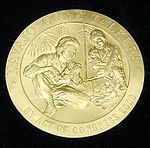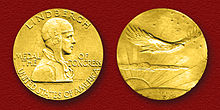- Congressional Gold Medal
-
A Congressional Gold Medal is an award bestowed by the United States Congress and is, along with the Presidential Medal of Freedom, the highest civilian award in the United States. The decoration is awarded to an individual who performs an outstanding deed or act of service to the security, prosperity, and national interest of the United States. American citizenship is not a requirement.
Contents
History
 Replica of Congressional Gold Medal presented to United States President Ronald and First Lady Nancy Reagan, 2002
Replica of Congressional Gold Medal presented to United States President Ronald and First Lady Nancy Reagan, 2002
Since the American Revolution, Congress has commissioned gold medals as its highest expression of national appreciation for distinguished achievements and contributions. Each medal honors a particular individual, institution, or event. Although the first recipients included citizens who participated in the American Revolution, the War of 1812 and the Mexican-American War, Congress broadened the scope of the medal to include actors, authors, entertainers, musicians, pioneers in aeronautics and space, explorers, lifesavers, notables in science and medicine, athletes, humanitarians, public servants, and foreign recipients.[1] The medal was first awarded in 1776 by the Second Continental Congress to then-General George Washington and John Paul Jones during the American Revolutionary War.[2]
Process of awarding
The Gold Medal and the Presidential Medal of Freedom are generally considered to carry the same level of prestige (though significantly fewer Gold Medals have been awarded). The chief difference between the two is that the Freedom Medal is personally awarded by the President of the United States (executive branch), and Congressional Gold Medals are awarded by acts of the Congress (both houses).
Per committee rules, legislation bestowing a Congressional Gold Medal upon a recipient must be co-sponsored by two-thirds of the membership of both the House of Representatives and the Senate before their respective committees will consider it.
A Congressional Gold Medal is created by the United States Mint to specifically commemorate the person and achievement for which the medal is awarded. Each medal is therefore different in appearance, and there is no rule of reaching a standard design for a Congressional Gold Medal. Congressional Gold Medals are also considered "non-portable", meaning that they are not meant to be worn on a uniform or other clothing, but rather displayed much like a trophy. Often, bronze versions of the medals are struck for sale.
A Congressional Gold Medal is a completely separate decoration from the Medal of Honor, which is a military award for extreme bravery in action. Another similarly named decoration is the Congressional Space Medal of Honor, presented by NASA for extraordinary accomplishment to the mission of United States space exploration.
See also
- List of Congressional Gold Medal recipients
- Awards and decorations of the United States government
- Congressional Silver Medal
- Thanks of Congress
References
Further reading
- Snowden, James Ross (1809-1878), Director of the Mint: United States Mint. (1861) A DESCRIPTION OF THE MEDALS OF WASHINGTON; AND OF OTHER OBJECTS OF INTEREST IN THE MUSEUM OF THE MINT. ILLUSTRATED, TO WHICH ARE ADDED BIOGRAPHICAL NOTICES OF THE DIRECTORS OF THE MINT FROM 1792 TO THE YEAR 1851. (Philadelphia: J. B. Lippincott & Co.).
External links
- List of recipients
- Congressional Research Service (CRS) Reports regarding Congressional Gold Medals
- PDF of CRS Report RL30076, Congressional Gold Medals, 1776-2006, Updated December 20, 2006
- Loubat, J. F. and Jacquemart, Jules, Illustrator, The Medallic History of the United States of America 1776-1876.
Categories:- Civil awards and decorations of the United States
- Awards established in 1776
Wikimedia Foundation. 2010.



